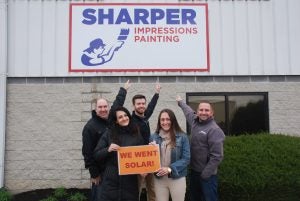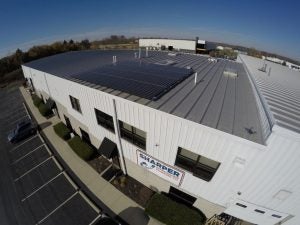Solar for businesses
Going solar

The process for powering your business with solar is similar in many ways to going solar at home. Commercial solar offers many different financing models and incentives. When you decide to take your business solar, it is important to look at factors that will affect the solar purchase as well as how you can best leverage the incentives and financing methods available.
Some things to consider as a business are how much cash you have on hand and your monthly electricity bills, as well as your ability and desire to finance a system. When going solar, knowledge is power. The more you know, the smarter your investment will be.
Businesses have two options to pay for their solar system:
- Direct ownership
- Third-party ownership (if available in your state)
Direct ownership means the business will purchase the system for its building or property and will own all of its electrical output. Direct ownership of a system makes sense if you have cash on hand, access to financing, or wish to retain ownership of additional incentives like the federal tax credit or Solar Renewable Energy Credits (SRECs).
With the passing of the Inflation Reduction Act of 2022, there are several things for businesses to consider regarding the federal tax credit:
- The tax credit can be upfront (Investment Tax Credit or “ITC”) or over time (Production Tax Credit or “PTC”)
- The ITC is 30% of installed system cost through at least 2032 (for projects under 1 MWac)
- The PTC value changes over time and is priced per kilowatt-hour (kWh)
- Businesses can transfer the tax credit to another party in exchange for payment for the tax credit’s value (IRS FAQ & another explainer)
- For projects under 1 MWac, there are adders for:
- 10% for projects located in energy communities (eligibility mapping tool, U.S. Dept. of Energy)
- 10% for projects using defined minimums of domestic content
- The adders above also apply to projects under 5 MWac when certain labor requirements are met.
- For projects under 5 MWac, by application and approval, there are also other adders available:
- 10% for selected projects located in low-income communities or on, tribal lands (map tool)
- OR 20% for selected “Qualified Low-Income Residential Building Projects” (eligible housing) OR “Qualified Low-Income Economic Benefit Projects” (See “Program Resources” section on DOE site for more info)
- See the Solar Energy Industries Association fact sheet on the law for more details
Under third-party ownership, a separate entity such as a solar developer or a group of community investors owns and operates the solar system on behalf of the business. The organization then pays the third-party for the monthly electricity produced by the solar system. A business may prefer a third-party ownership model if it does not wish to process the federal tax credit or maintain the system over its lifetime. Third-party ownership is only available in certain states. Find out where.
SUPPORT OUR WORK
Make a tax-deductible donation today to Solar United Neighbors to help more people go solar, join together, and fight for their energy rights.
A few special considerations

Several incentives are available to businesses that go solar:
- Accelerated Depreciation: The Modified Accelerated Cost Recovery System (MACRS) allows businesses to recover investments in assets through tax deductions. Businesses can deduct 85 percent of qualified solar equipment over a five-year period. To learn more about accelerated depreciation read this article from the Solar Energy Industries Association. Talk to your accountant about how best to manage the tax benefits of going solar.
Resources
-
- Dept. of Energy ITC for Business – Comprehensive information about ITC for business
- Why your business should (finally) go solar – This is an overview of the benefits of adding solar to your business.

